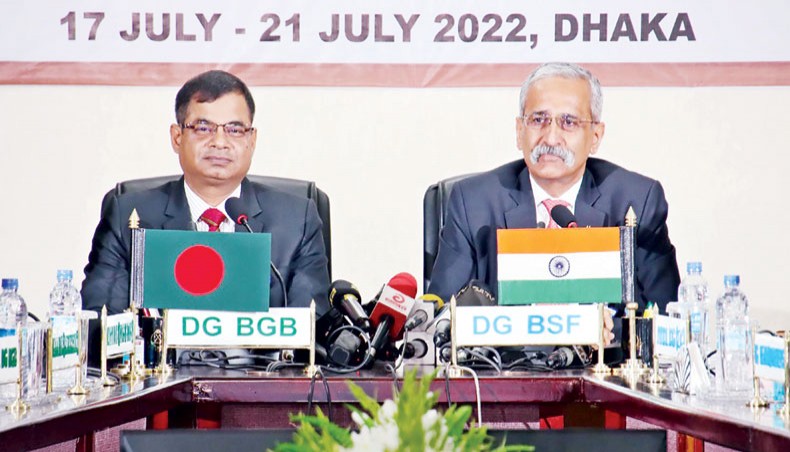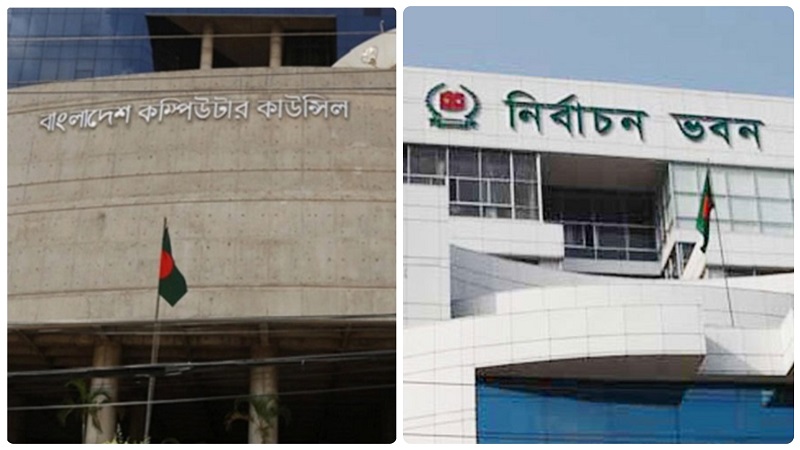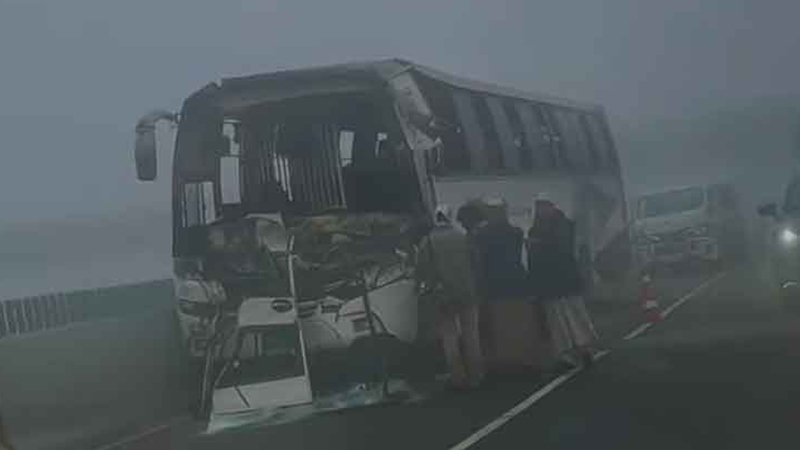Border Security Force of India and Border Guard Bangladesh on Thursday agreed to bring down the killing, injuring or beating of unarmed nationals of both countries to zero by adopting extra precautionary measures along the international border, increasing coordinated patrols, especially from late night to morning, enhancing vigilance and sincere commitments.
A joint statement on the 52nd director general-level border conference between the two forces also said that both sides agreed to undertake joint efforts to bring down the number of incidents of assault or border crime by intensifying public awareness campaigns by undertaking appropriate socio-economic developmental programmes in vulnerable areas.
The statement also emphasised educating the border population about the sanctity of international boundaries and preventing criminals or inhabitants from crossing the boundary.
The joint statement was issued at a press conference held at the BGB headquarters in Pilkhana at the end of the five-day conference.
According to the statement, read by BGB director planning Lieutenant Colonel Taslim Ehsan, both sides agreed to take effective steps to continue to sensitize the border populace to refrain from violating international boundaries, illegal crossing, intrusion, and smuggling, human-trafficking, uprooting border pillars, and other trans-border crimes.
Highlighting the importance of a coordinated border management plan in curbing the menace of smuggling contrabands, such as, various narcotics, especially yaba, firearms, fake Indian currency notes, and gold, among others, both sides agreed to remain cautious and steadfast to stop smuggling through sharing of real-time information and active anti-smuggling efforts through optimum involvement and pursuance.
The joint statement also said that both sides mutually agreed to constructively engage the respective higher authorities for every concurrence of the pending developmental work within 150 yards of the international boundary with special emphasis on the Akhaura-Laksham Railway project, which remained suspended for quite long.
After the read-out of the joint statement, BSF director general Pankaj Kumar Singh said that people killed along the border at night were ‘ notorious criminals’ while Border Guard Bangladesh chief Major General Shakil Ahmed said those killings would strain bilateral relations.
Bordering killing was at the top of the agenda in the half-yearly meeting that began on July 17. The meeting discussed a few other issues, including trans-border crimes, human trafficking, and construction works within 150 yards of the international boundary.
According to the BGB headquarters, 161 Bangladeshis were killed at the hands of BSF between January 2015 and June 2022 while 41 others were killed by Indian nationals.
Ain o Salish Kendra data showed that 23 people were killed along the India-Bangladesh border between January 2021 and June 2022. According to the Dhaka-based rights group, most of the victims were shot to death by BSF.
At least 1,253 Bangladeshis were killed along the border by the BSF between 2000 and 2021, according to the data shared by another rights group Odhikar.
Asked why border killings continued despite repeated promises, the BSF chief argued that fishermen and farmers had no business on the border fence between 10:00pm and 4:00am.
‘We have made no distinction between criminals either on our side or your side…we used lethal force and killed eight Indian men in the period. These are Indian citizens,’ he said.
‘Criminals are criminals who do not know any boundary. We have lost one BSF personnel also,’ he argued, replying to a volley of questions.
‘All the lethal firings have been taking place at night. Not even a single firing takes place in daylight. You can check it,’ he said.
Asked, why BSF was calling them criminals without applying any judicial mechanism, the BSF chief argued that those killed were all listed criminals.
‘We do not go only by the judicial system to say that a person is a criminal’ he said.
‘We have exchanged the list of criminals… and we verified. The people who have lethal weapons used against were on the list of the people given beforehand. These are listed, notorious criminals.’
He argued that when the criminals came to know that the BSF was using non-lethal weapons they started hitting them with sharp weapons leaving 98 personnel injured in recent years.
Asked for a reaction over BSF’s branding of Bangladeshi border killing victims as criminals, the BGB chief said that it had an impact on bilateral relations.
‘It has a negative impact on the neighbourhood,’ he said, adding, ‘and overall, it also has an impact on bilateral relations, especially it raises questions on existing professional relations between BSF and BGB.’
He said that he told the BSF delegation that border killing is not only a mere death it also makes the victim’s family suffer.
He claimed that the Indian side understood the situation and decided to work together with harmony, cohesion, trust, and understanding to bring the border killing ‘menace’ to zero level.
‘The DG of BSF has agreed to bring the border killing to zero by working jointly,’ said the BGB chief.
‘We are trying to increase both formal and informal interaction between the two forces,’ he said.
Asked about the Rohingya push-in to Bangladesh, the BGB chief said the 212 Rohingyas from 51 families, who cross the international border and came to Bangladesh, took the help of middlemen.
He said that they had intensified border patrolling in coordination with their counterpart so that not only the forcibly displaced Myanmar nationals but also other people could not be easy targets of the middlemen.













